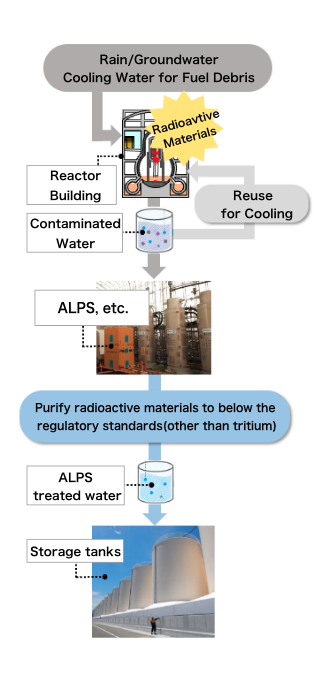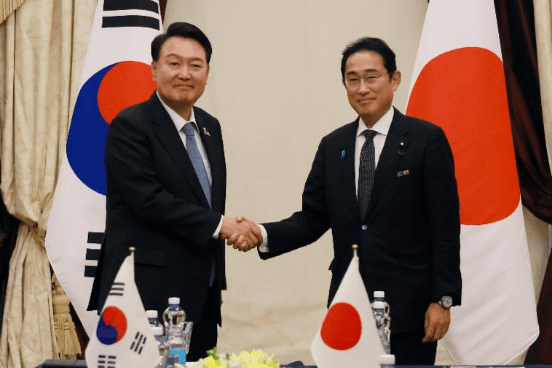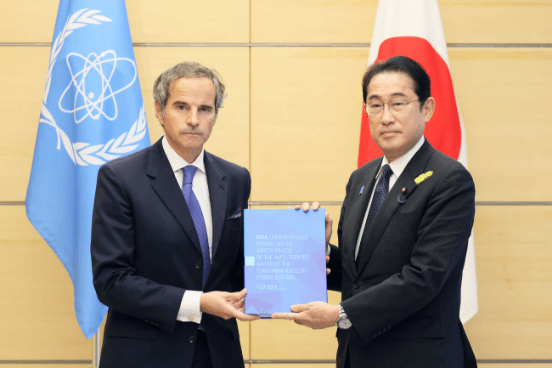Japan's efforts related to ALPS treated water
Efforts by the Government of Japan, regarding the safety of ALPS treated water, measures against reputational damage, and explanation to world leaders and international organizations.
Safety of ALPS treated water
What is ALPS treated water?


"ALPS treated water" is the water that contains radioactive substances from inside the buildings of the Tokyo Electric Power Company's Fukushima Daiichi Nuclear Power Station, and that has been purified and treated until it satisfies safety standards for all radioactive substances besides tritium. For tritium, the water is significantly diluted with seawater before the discharge so that it fully satisfies safety standards. There is no concern about effects on human health or the environment.
The concentration of radioactive substances in the ocean prior to and after the discharge will be monitored under reviews by a third party in order to ensure safety.
Annual Tritium Discharged in Neighboring Countries and Regions
Tritium is discharged into the sea and rivers as liquid effluents and into the atmosphere through ventilation etc., in compliance with the laws and regulations of each country and region.
Impact of ALPS treated water on the human body, etc.
The results of the assessment of the impact of ALPS treated water on humans are approximately 1/70,000~1/1,000,000 of the impact from natural radiation (Japanese average: 2.1 mSv per year).
What is tritium?
Tritium is a relative of hydrogen atom with two more neutrons that is widely present in nature. Tritium emits very weak radiation that can be prevented with a sheet of paper. Even if it enters the body, it is not accumulated and is excreted with water.
The Discharge of ALPS Treated Water: Ensuring Safety and Paving the Way Toward Decommissioning
Japan will progress toward the decommissioning, of Fukushima Daiichi Nuclear Power Station, discharging ALPS treated water with safety as the top priority.
Preventing reputational damage
In order to promote domestic industries and advance reconstruction, the Government will take full responsibility in carrying out measures against reputational damage and in meeting concerns regarding the continuity of livelihoods caused by the discharge of ALPS treated water.
5-pillar package to protect the fisheries industry

The Government has compiled a 5-pillar package of 100.7 billion yen, including a reserve of 20.7 billion yen.
Supporting the Sanriku and Joban Regions through Food
The Sanriku and Joban regions, consisting of Iwate, Miyagi, Fukushima and Ibaraki prefectures, offer wonderful fish and other marine products. We've just eaten some of their fine products.
Why don't you join us in showing your support by buying some safe and flavorful fish and marine products from Sanriku and Joban and from all around Japan?
Visit to Fukushima prefecture

Prime Minister Kishida inspected the facility for discharging ALPS treated water into the sea, and was briefed on the status of efforts to ensure the safety of the process. The discharge is a long-term task. The government will spare no effort in ensuring safety, disseminating relevant information in a highly transparent manner, and carrying out measures against reputational damage.
Towards better global understanding
IAEA review
The International Atomic Energy Agency (IAEA), which has extensive expertise related to nuclear power, has also confirmed that discharge into the sea is based on scientific evidence and consistent with international practices.
The IAEA will carry out its review not only before the discharge but also after the discharge, on a long-term basis.
ASEAN-related Summit meetings

With regard to the discharge of ALPS treated water into the sea, Prime Minister Kishida once again comprehensively explained Japan's responses to the countries of ASEAN, the G20 members, and others during the succession of meetings and bilateral talks.
Japan-ROK Summit

Regarding the ALPS treated water, Prime Minister Kishida mentioned the Comprehensive Report issued by IAEA, and reiterated, as Prime Minister of Japan, that every possible measure would be taken to ensure the safety of discharge and that any discharge that would harm the health of Japanese and Korean citizens or the marine environment would not occur.
IAEA report

Director General Grossi presented the comprehensive report on the safety review of the ALPS treated water. The Government of Japan will continue to work based on scientific evidence and give detailed explanations with high transparency both at home and overseas.
Response from the international community
Efforts by Relevant Ministries and Agencies
Monitoring the safety of ALPS treated water
Relevant ministries and agencies coordinate to monitor the safety of ALPS treated water throughout the entire process, from pre-discharge analysis to the analysis of surrounding waters, fishery products and marine life.
 Conducts sampling on fisheries products in Fukushima and neighboring prefectures.
Conducts sampling on fisheries products in Fukushima and neighboring prefectures. Monitors the level of tritium and others in waters and in aquatic organisms off Fukushima and neighboring prefectures.
 Presents results of marine monitoring related to the accident at TEPCO's Fukushima Daiichi Nuclear Power Station.
Presents results of marine monitoring related to the accident at TEPCO's Fukushima Daiichi Nuclear Power Station.  Displays results of monitoring conducted by relevant organizations using visual symbols.
Displays results of monitoring conducted by relevant organizations using visual symbols.
For further information on ALPS treated water
 Official web page of the Ministry of Economy, Trade and Industry, providing science-based information on ALPS treated water in a manner that is easy to understand.
Official web page of the Ministry of Economy, Trade and Industry, providing science-based information on ALPS treated water in a manner that is easy to understand.  Official web page of the Ministry of Foreign Affairs, presenting diplomatic activities such as communication with other countries and regions regarding the ALPS treated water.
Official web page of the Ministry of Foreign Affairs, presenting diplomatic activities such as communication with other countries and regions regarding the ALPS treated water.  Official web page of the Ministry of the Environment, presenting results of marine monitoring related to ALPS treated water, conducted by relevant ministries and agencies.
Official web page of the Ministry of the Environment, presenting results of marine monitoring related to ALPS treated water, conducted by relevant ministries and agencies.  Official web page of the Consumer Affairs Agency, providing information on radioactive materials in food products.
Official web page of the Consumer Affairs Agency, providing information on radioactive materials in food products.  Official web page of the Fisheries Agency, providing sampling results, such as results of the monitoring on radioactivity level in fisheries products.
Official web page of the Fisheries Agency, providing sampling results, such as results of the monitoring on radioactivity level in fisheries products.  Portal site of the Reconstruction agency, providing information on the reconstruction of Fukushima prefecture, basic information on radiation and Q&A on ALPS treated water.
Portal site of the Reconstruction agency, providing information on the reconstruction of Fukushima prefecture, basic information on radiation and Q&A on ALPS treated water.  Official web page of the Nuclear Regulation Authority, providing the summary of efforts regarding the accident at TEPCO's Fukushima Daiichi Nuclear Power Station.
Official web page of the Nuclear Regulation Authority, providing the summary of efforts regarding the accident at TEPCO's Fukushima Daiichi Nuclear Power Station.